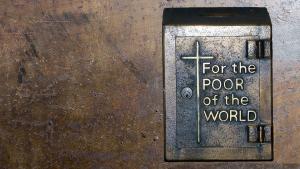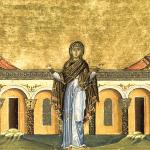
The preferential option for the poor, though it is a recently-established phrased, is an expression of one of the great truths of the Christian faith, a truth found throughout Scripture and Christian history. God has helped and continues to help and promote those who are otherwise poor and helpless over those who have privilege and use that privilege against the needs of the common good. The poor, the vulnerable, those in extreme need are to be loved. Those who are well-to-do, those who have more material goods than others, are meant to use what they have for the benefit of the common good, focusing their attention especially on those who have little or nothing of their own. If the rich get richer, they have that much more responsibility and obligation to help the poor. If the rich do not do this, the woe Jesus gave to the rich will be upon them, and they will suffer the consequences of their inaction, either in this life or in the life to come (cf. Lk. 6:24).
The preferential option for the poor has been declared so as to make sure that we are not complacent and indifferent to the plight of the poor and needy; since the poor find their poverty often comes from the system in which they live, a system which benefits those who already have power and wealth, the preferential option for the poor tells us we cannot allow things to remain as they are, that we must change the system and the structures of sin contained within it. Sadly, so many who call themselves conservative defenders of tradition, because all they do is seek to preserve the system as it is, not only allow such injustices to remain, they seek to defend them despite the harm which they cause. But, as Sergius Bulgakov pointed out, the very notion of Christian repentance goes against such conservatism, and so the church must seek out and promote social justice instead of being held back from addressing it:
Does not this “repent” call us to new achievements, and especially to the testing and re-examination of what we are accustomed to consider self-evident and on which we rest complacently? Do the people of the Church seek out social justice or the social utopia corresponding to the needs of their era, with its unique dynamism, or do they remain satisfied only with a static conservatism that for them exhaustively sums up “fidelity to tradition”? [1]
Letting things remain as they are goes against the Gospel message of Christ because the Gospel calls us to repent and change so as to make things better than they were before. Even if things will not be perfect this side of the eschaton, we must repent, doing the best we can to heal the wounds of past and current injustices. We must open our hearts, for when we are able to sympathize with those who have been neglected or abused, we find ourselves most human, as Albert Schweitzer wrote: “We must never permit the voice of humanity within us to be silenced. It is man’s sympathy with all creatures that first makes him truly a man.”[2] Our true nature is good; the corruption of sin turns us against our nature. Thus, we are following our natural goodness, our humanity, when we open our hearts and look to the world with loving compassion. In doing so, we are engaging the image and likeness of God, the image and likeness of love, contained within our nature. When we give of ourselves to the world and all that is in it instead of finding ways to take of it and make it exclusively our own, we imitate the work of the Incarnation, indeed, it is as if we incarnate ourselves into the world, as Florensky deftly noted:
‘It is better to give than take’. This doesn’t just apply to social relationships, but to the whole world: the line of activity in the world is the source of consciousness and understanding, and without it comes dreams and they always die. A person closed in his subjective sphere, without an influx of nourishment, is slowly falling asleep, even as his dreams fade away. Incarnation is the foundational commandment of life. Incarnation, that is the realization of one’s possibility in the world, the acceptance of the world into oneself and the formulation of matter by itself. Only with Incarnation can we verify our truth and worth, otherwise it is impossible to critique oneself soberly.[3]
The wealthy, to be sure, those of extreme privilege, can never justly earn all the wealth which they possess; they either inherited it or benefited from the system which allowed them to receive a bounty beyond measure, a bounty which takes away from those in need. They can make recompence, that is, they can be saved, but they must put into action the preferential option for the poor, giving of themselves and what they have to those in need. They must not merely imitate virtue, giving a small amount in order to make themselves look good, for all that does is hide their actual vice. Those who are discerning will perceive them for what they truly are and so will not be seduced by the show the rich act in order to look better than they are: “Vice mimics virtue and cockle works to pass for wheat, which it resembles, though a discriminating palate is not thereby deceived.” [4] So as not to put on a show, the rich must become like Zacchaeus who gave more than he had taken in order to receive the true riches of grace:
Much truth there is, indeed, in a certain saying of a philosopher: ‘Every rich man is either wicked or the heir of wickedness.’ That is why the Lord and Savior says that it is difficult for the rich to enter into the kingdom of heaven. Someone may raise the objection: ‘How, then, did the wealthy Zachaeus enter the kingdom of heaven?’ He gave away his wealth and replaced it at one with the riches of the heavenly kingdom. The Lord and Savior did not say that the rich will not enter the kingdom of heaven, but that they will enter with difficulty. [5]
It is important to remember the source and foundation of every good is God, and that God all such good for the sake of all. We must strive not circumvent the just and universal distribution of goods by taking for ourselves in a way which leaves others wounded. The more we increase our wealth and make ourselves rich, the more likely we will increase our own depravity, as our focus will be on our private good and the immediate pleasure we attain from it instead of the common good. St Salvian viewed with horror Christians ignoring the common good, saying that despite the increase number of Christians in the world, the vices increased with them as they sought not the common good: “Your vices increase almost as much as the number of Christians increase. Your lack of restraint increases in proportion to your increase in wealth.” [6]
The preferential option for the poor must not be seen as being optional; that is a misunderstanding of the term “option.” It does indicate a choice, to be sure, the choice which God has chosen indicating, therefore, the path which Christians must follow if they want to continue to be in God’s good grace. It is not an easy path. Most of us fail it in many ways. This is one reason among many why our whole life should be one of constant reformation or repentance. For when we have gone against the fundamental option shown by God, we must work hard to bring ourselves back to it, to live it out, and truly take our place next to God as we embrace the work of God in history. The option for the poor is not optional, but rather the consistent way God has worked in and with the world, indicating, therefore, the way God expects us to work in and with the world. Let us not be like the rich man who, when he was told what was expected of him, went away sad and dejected (cf. Matt. 19:22); let us rather embrace the option and find a way to live it out throughout our whole life, so that we can receive and be received by God in all beatitude.
[1] Sergius Bulgakov, “The Soul of Socialism (Part II)” in The Sophiology of Death. Essays on Eschatology: Personal, Political, Universal. Trans. Roberto J. De La Noval (Eugene, OR: Cascade Books, 2021), 33.
[2] Albert Schweitzer, The Animal World of Albert Schweitzer. Trans. and ed. Charles R. Joy (Boston: Beacon Press, 1950), 177.
[3] Pavel Florensky, Letters from the Gulag. Trans. Adela Lawless (No City: Independently Published, 2020), 266. [To Olyen, Aug. 25, 1936].
[4] St. Cyril of Jerusalem, Procatechesis and Catechesis 1-12. Trans. Leo P. McCauley, SJ and Anthony A Stephenson (Washington, DC: CUA Press, 1969), 119 [Catechesis IV].
[5] St. Jerome, The Homilies of Saint Jerome: Volume I (1-59 On the Psalms). Trans. Marie Liguori Ewald, IHM (Washington, DC: CUA Press, 1963), 116-7 [Homily 15].
[6] Salvian the Presbyter, “The Four Books of Timothy to the Church” in The Writings of Salvian the Presbyter. Trans. Jeremiah F. O’Sullivan (Washington, DC: CUA Press, 1962), 270.
Stay in touch! Like A Little Bit of Nothing on Facebook.
If you liked what you read, please consider sharing it with your friends and family!













